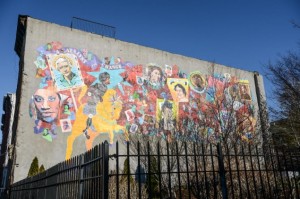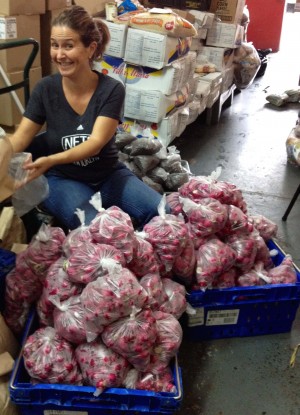The Power of Service Can Transform Community, When Rooted in Strong Partnerships
Last month I spent three hours sorting radishes at a Brooklyn food pantry in Bed-Stuy — edible, rotten, edible, rotten. It was the least glamorous of volunteer experiences, and honestly, at first I was disappointed to have committed my time to something so mundane. But the radish sorting slowed me down, and those hours created space for thinking and conversation that shifted my perspective.
Talking to my fellow volunteers as we sorted side by side, I learned that some were there to fulfill mandatory community service hours and others were motivated by uneasy feelings about moving into a low-income community and the impact of gentrification. I exchanged smiles with the clients as they lined up for donated groceries and experienced a deepening sense of obligation to my neighbors. I quietly observed inefficiencies in the system and contemplated how I might personally contribute to better supporting Brooklyn’s hungry.
I’m not alone in recognizing the power of service.
In fact, Americans under the age of 30 are more serious about volunteering than their parents were, according to a new Associated Press-Gfk poll. Now, more than ever, the Jewish community must embody one of its core values and make service a defining element of Jewish life. Through service, we have the potential not only to realize our aspirations to make America a more just society, but also to ensure a strong future for ourselves as a Jewish community.
At Repair the World, where I work, we’ve found that millennial Jews who volunteer multiple times report an increased commitment to social justice and a stronger desire to serve disadvantaged communities. Volunteering, our research shows, builds a pipeline of young leaders who want to contribute to creating a better world.
I’ve spent the past six months on a listening tour in Central Brooklyn and have met with more than 100 community leaders to understand the landscape from the perspective of those who live there. My goal has been to identify potential partnerships where the Jewish community can volunteer to address hunger and strengthen education.
For volunteering to have a substantive impact on a community or issue area, it has to be rooted in partnership, done with — not for — the community. Volunteering that is the byproduct of respectful partnership, where everyone involved learns from the experiences of the other, builds authentic bridges between communities and ensures that the service work is actually needed.
The challenge is that partnership usually takes time and shared experience to develop. In some cases, where it is clear that committed volunteers will increase the community’s capacity, partnership has developed naturally; for example, utilizing volunteers as literacy tutors or to raise awareness about food benefits. At other times it’s been challenging, as some of the most serious issues facing those in Central Brooklyn — like affordable housing or intra-group violence — don’t have clear answers or easily constructed volunteer opportunities. The Jewish community’s approach must be to listen with humility and to collaborate on determining the most effective ways that volunteers can help strengthen the community.
In a time of growing concern about young Jews’ declining affiliation rates, service offers an opportunity for engagement that is relevant and rooted in core Jewish values. Jewish tradition obligates us to clothe the naked, feed the hungry, and visit the sick. In fact, it teaches that lovingkindness, defined as personal service from one person to another, is the very foundation stone of the universe.
Address Needs – But Also Causes
This obligation leads us not only to care for those in need but also to address the causes that create those needs. A Jewish community that lives out these core values of lovingkindness each day is a strong, vibrant, and attractive place for those who care about their neighbors and about building a better world.
I imagine a Jewish community that regularly engages in service with its neighbors — Jewish and non-Jewish alike, that develops ongoing relationships with other faith-based communities, and that regularly engages our youth in a conversation about the meaning and importance of helping others. By acknowledging and prioritizing volunteering as one of the central elements of Jewish life, we have the potential to transform our world, and ourselves as well.
Dr. Martin Luther King Jr. once said, “Life’s most persistent and urgent question is: “What are you doing for others?” As we mark MLK Day and celebrate his legacy, let us recommit to service.
Cindy Greenberg is Director of Repair the World: NYC, which launches on MLK Day with more than a dozen volunteer opportunities in Brooklyn in partnership with 25 community organizations. All projects include a service-learning component to explore the broader context of the issue the project is addressing.
![[the current issue of ZEEK]](../../image/2/100/0/5/uploads/leftistethicistgraphic-52842c6a.png)
- 5000 Pages of Zeek
- Founded in 2001, Zeek was the first Jewish online magazine, and we have over 5000 pages online to prove it, all available free of charge. Read more in the Archive.
More articles by
Cindy Greenberg
More articles in



